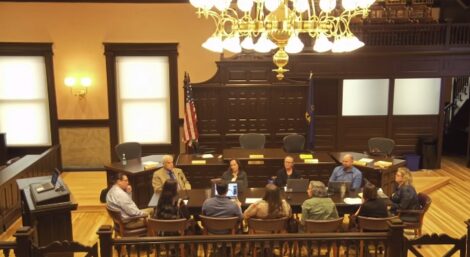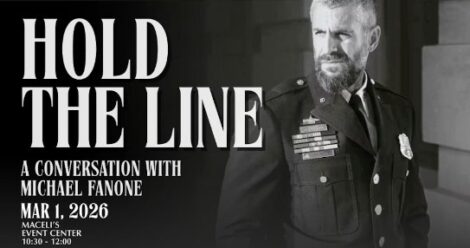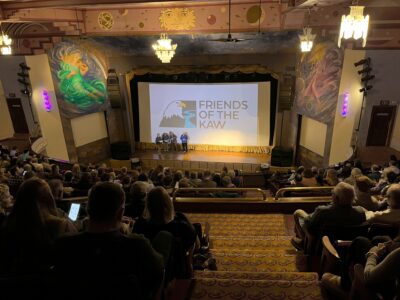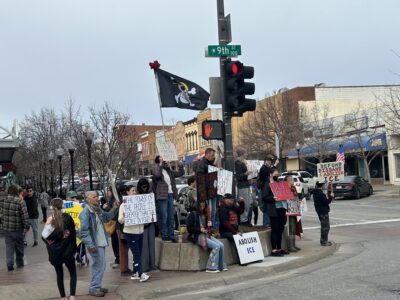With help from an ‘awesome community’ of ultra-marathoners, these two Kansans are running nearly 250 miles across the state in 5 days

photo by: Contributed
Sean Frost (left) and Jonathan Prosser on the Kansas River bridge in Lawrence on Friday, May 23. The two made a pit stop in Lawrence Friday afternoon as they are completing a five-day, 250-mile run from the northern state line of Kansas to the southern state line. They have said the most important part of the race has been the community — both supporting them and raising money for charity.
On their mission to run all the way across Kansas from north to south, Jonathan Prosser and Sean Frost got chased by dogs, jumped over a creek, had to spend the night in a van because there were no hotels nearby.
And that was just the first day.
The two ultra-marathoners from Topeka, who are running both to challenge themselves and to raise money for charities in their hometown, should soon be reaching the home stretch of their five-day route. They’ve packed vests full of food and supplies and meticulously mapped out where to rest and restock. But they also know from experience that you can’t plan for everything.
“So much can go wrong in five days,” Frost said.
On Friday, the friends crossed the Kansas River Bridge and made a pit stop in downtown Lawrence for lunch, and they spoke to the Journal-World about their run. They shared more about how their love for running began, the intense preparations they undertake, what gave them idea to run across the state, and the “awesome community” of long-distance runners that helps them through it all.

photo by: Bremen Keasey
Jonathan Prosser, left, and Sean Frost during their lunch break in downtown Lawrence on Friday, May 23, 2025. The two were in the middle of attempting a 250-mile, five-day race from the northern state line to the southern state line of Kansas.
• • •
For Prosser, the ultra-marathon obsession started with pick-up basketball. For Frost, it started with picking up a book.
Prosser simply started running as a way to stay in shape for his pick-up games. He initially worked his way up to a half-marathon, but before long he was attempting ultra-marathons — a term for any race longer than the 26.2 miles in a marathon. He loved the positive and uplifting community around the sport, he said, and pushed to do more and more, including finishing races longer than 100 miles.
Frost, meanwhile, had tried several times to get into running, but every time he tried, his progress was cut short by injuries. Then he read a book by Christopher McDougall called “Born to Run,” which is partly about an Indigenous tribe in Mexico’s Copper Canyons and the traditional techniques they practice that help them run long distances without injuring themselves.
He found the book fascinating. “I can’t believe there are people who do those things,” he said.
In the book, McDougall also writes about his own journey to improve as a runner, and about a coach who helped him find a program that would let him run longer distances without hurting himself. Frost was inspired by that to read a book by the coach who worked with McDougall, and soon Frost developed a similar running program for himself that led to his being able to compete as well.
Like Prosser, Frost immediately felt welcomed into the ultra-running community. After completing a trail race in Lawrence, he was invited to a 12-hour race, where the goal was to run as many miles in that time as possible. Frost ran 42 or 43 miles, he said, and from then on he was completing more and more events.
It was through these kinds of races that Frost and Prosser met, and they did a variety of challenging events together, including a three-day run in Arkansas that was 94 miles long.
The idea to run across Kansas specifically came to Prosser while he was listening to a podcast about an ultra-marathoner in Iowa who had mapped out and completed a run across that state.
“If there’s people doing this,” Prosser asked himself, “I wonder how far it is across Kansas?”
Turns out, it’s about 250 miles from the border with Nebraska to the border with Oklahoma. It was longer than anything that the two men had attempted before, and when Frost heard about Prosser’s idea, he was in.
“I’m pumped to do this with Jonathan,” Frost said. “When you have friends with you, it brings a whole new thing to the mix.”
• • •
For a project like this, of course, ultra-marathoners can’t just lace up their shoes and go. They have to put together a detailed itinerary — what routes they will take, where they will sleep, how they’ll get food and water and replenish electrolytes.
“The running aspect is hard physically, but the real challenge is to try to coordinate a lot of it,” Prosser said.
To start, Prosser charted a path from the northeastern corner of the state — near where the Nebraska, Missouri and Kansas borders meet — down to the Oklahoma state line just south of Coffeyville. According to the GPS data, the whole route is 245.4 miles long.
Broken down over five days, it looks like this:
• Thursday, May 22 – Nebraska border to Oskaloosa, 66 miles.
• Friday, May 23 – Oskaloosa to Ottawa, 56 miles.
• Saturday, May 24 – Ottawa to Iola, 50 miles.
• Sunday, May 25 – Iola to Cherryvale, 54 miles.
• Monday, May 26 – Cherryvale to Coffeyville, 19 miles.
The route needs to have places to restock on food, water and other supplies. To find out where to stop, Prosser said he drove along parts of the route and took pictures of possible shelters, gas stations or other stops and marked their locations.
In between those stops, the runners have vests that they’ve filled with equipment, water and food — “as much nutrition as we can pack,” Frost said.
As well as fatigue, hunger and thirst, the runners will need to manage things like blisters and sunburn. Some parts of the route have more options than others in terms of places to stop or resupply, and the longer a run is, the harder it is to plan.
• • •

photo by: Bremen Keasey
Sean Frost filling up his water bottle with a mix of water and electroltye solution in downtown Lawrence. Frost and Prosser said many members of the running community volunteered to help them re-supply during their five-day ultra marathon.
Fortunately for them, ultra-runners are, as Frost puts it, “an awesome community that supports each other doing hard things.”
Since they have started talking about the run, people have offered “all kinds of support,” Frost said. He said his dad was trying to follow along on the route and assist in whatever way he could, and runners across the state have stepped up and offered to help, too.
One friend jokingly offered to drive alongside them and throw cheeseburgers to them to resupply them with food. Another, a professional masseuse, offered to give them massages to help them recover. Still others have said they wanted to run alongside them on parts of the route, reminiscent of the cross-country run in the movie “Forrest Gump.”
“That’s the cool part of the community,” Prosser said. “They want to get behind you.”
When the two stopped on Massachusetts Street for lunch on Friday, they were met by a friend with a truck to help them recharge. That meant ice-cold water, electrolyte packets and other essentials to prepare them for the more than 20-mile trip to Ottawa to finish up the second leg.
The runners had already encountered some things they didn’t expect, including those dogs on the first day — some friendly, some not, Frost said — and that jump across the creek, which was necessary because part of the route they’d planned was closed. So every bit of help and every pleasant surprise is that much more welcome.
“It’s been great to see the outpouring of support from different communities,” Frost said.
• • •
Along with supporting Frost and Prosser on the long trip, many of their helpers have also been supporting the organizations that the runners are raising money for.
Each runner is raising money for a Topeka-based organization. For Prosser, it is Lifeline Children’s Services, which provides support for vulnerable children through efforts like foster care and adoption services. For Frost, it’s the Topeka Collegiate School’s endowment fund to pay for scholarships for children to attend the independent school.
When Prosser was planning out the race, he was just thinking about completing the journey. But as the run took shape, he realized it could be used to raise awareness and money for good causes.
“I thought if I’m going to do this, I might as well do something good out of it,” Prosser said.
As of Friday afternoon, Prosser said he’d raised more than $7,000 dollars for Lifeline, and he said he’s found a donor who will match the donations if he is able to raise $25,000. Frost said that the donations to the Collegiate School fund were part of an ongoing fundraising drive, so he didn’t have the exact amount he’d raised.
When the two spoke to the Journal-World, they were less than two days into their route, and Frost said that after 100 miles of any race, “every step becomes difficult.” At that point, every muscle in your body wants to quit, he said, and most of your thoughts are, “This is stupid.”
But the great thing about ultra-running, he said, is that it changes your perspective. By pushing through these types of challenges, it makes other challenges in your life seem much smaller.
“You think, ‘Man, if I can do that, I can do anything,'” Frost said.





